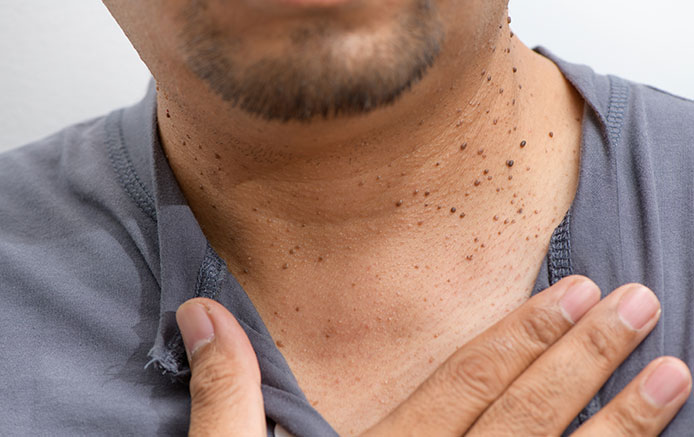
SERVICES
Skin Tags
What are skin tags?
Skin tags are painless, benign (non-cancerous) skin growths generally on a small, thin stalk called a peduncle. Skin tags are made up of blood vessels and collagen surrounded by an outer layer of skin. They are common in both men and women, especially after the age of 50. Skin tags may appear anywhere on your body even though they commonly appear in places where the skin folds, like:
- The armpits
- The groin
- The thighs
- The eyelids
- The neck
- The area under the breasts
Skin tags do not cause any symptoms. In some cases, friction due to a skin tag rubbing against the skin, clothes or jewellery can cause bleeding or discomfort. The cause of skin tags is unknown. Due to them appearing in skin folds, friction can play a massive role in the appearance of skin tags. Other factors that may contribute to the development of skin tags include:
- Human Papillomavirus
- Insulin resistance, which may lead to type 2 diabetes and prediabetes
- Pregnancy – skin tags are a common side effect of pregnancy due to pregnancy hormones and weight gain.
- Genes
How are skin tags treated?
For those who are unbothered by their skin tags, treatment may not be needed. However, if the skin tags rub against clothing, jewellery, or skin and cause irritation or pain, they can be removed. As a dermatologist, Dr Zinzi Limba can remove skin tags using:
Cryotherapy
This procedure involves the use of liquid nitrogen to freeze and remove abnormal tissues such as skin tags. Cryotherapy is also known as cryosurgery or cryoablation.
Cauterisation
Also called cautery, it is a procedure where the skin tag is burned using high-frequency electrical energy (electrolysis).
Ligation
This procedure involves removing skin tags by tying them off using surgical thread to cut off blood flow to the region.
Excision
This is the surgical removal of skin tags with the use of scissors or a scalpel.
Sking Tag FAQ:
What is the difference between skin tags and warts?
Warts are caused by a virus called Human Papillomavirus (HPV) and are very contagious, while skin tags are not contagious.
Can the removal of skin tags cause more to grow?
Removing skin tags will not cause more skin tags to grow.
Can skin tags be prevented?
Unfortunately, skin tags cannot be prevented.

